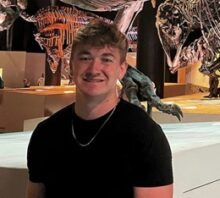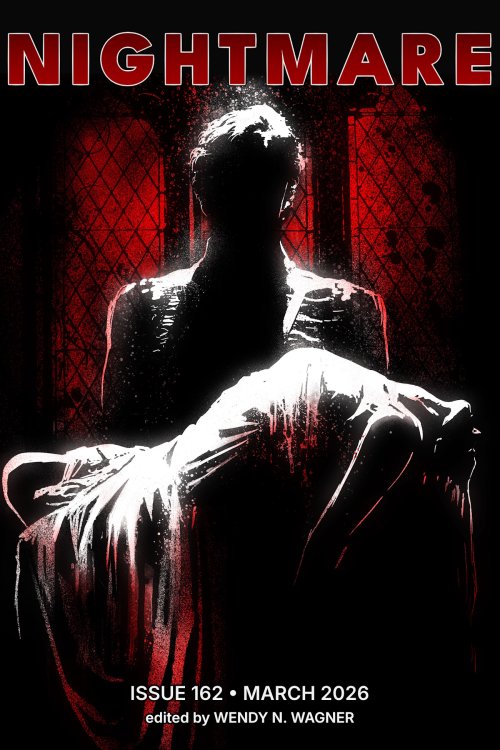I understand that you studied law at Oxford and worked as a criminal barrister for quite some time. How did your education and your experiences working in the legal field shape your creative work?
I think something that filters into a lot of my creative work is the idea of being trapped by the life you’re told that you “should” want, or getting everything you’ve ever wanted and finding that there’s a pretty significant catch. While I don’t regret my earlier career, I have to say that I was incredibly stressed, burnt-out, and miserable a lot of the time. In “Billy Blue,” Alice finds out that she should be careful what she wishes for—economic stability, a home, a partner who will “take care of her”—because it turns out to be a poisoned chalice. And on a more flippant note, I’m sure that years spent immersed in the dark, morbid, and awful side of life have contributed to my particular voice; it’s pretty hard to gross or freak me out!
What inspired you to write “Billy Blue”?
I live near the Greenwich Peninsula, which is an area of London crammed full of new-build blocks of luxury apartments, some of which (particularly during the COVID lockdowns) seemed almost entirely empty. I would often notice a single light in the stairwell or at the top of these huge buildings, and think about how eerie it would be to be the only person living there. I coupled this with the area’s real-life industrial past as a gasworks—which would have been the site of back-breaking, dangerous, exploitative labour conditions—to come up with my ghost, which (I hope) is a nice little twist on the “haunted burial ground” trope.
You open the story with the epigraph, “Yesterday upon the stair, I met a man who wasn’t there . . .” We later learn that the nursery rhyme is something Alice’s grandfather said to her. What is the significance of this quote to you? Was it something a family member said that stuck with you or was it just a rhyme that you thought lent itself well to the story?
This is a rhyme that’s always struck me as incredibly sinister. I think my father used to recite the parts in the story to me—hence why I’ve always assumed it to be some sort of nursery rhyme! But I’ve looked it up just now and the whole poem—“Antigonish” by William Hughes Mearns—is even more panicked and nightmarish, with a central verse that reads: “When I came home last night at three / The man was waiting there for me / But when I looked around the hall / I couldn’t see him there at all! / Go away, go away, don’t you come back any more!”
In stories about haunted locations, it’s often the building itself that stops characters from leaving. In this story, you’ve reversed that trend. Alice is trapped by so many things: an abusive boyfriend in James, sexist expectations from her mother and society, and the fear of being alone when her baby is born. However, Alice is pushed to escape by Billy Blue and the haunted building itself. Was this flipping of the script something you were aware of and planned to do, or was it just something that happened naturally?
When I started writing the story, I knew that Alice would be trapped in the building and encounter an otherworldly presence that didn’t take well to the site’s clean-up and “regeneration.” Initially I wasn’t sure how it would end, but as I started to read into the history of the gasworks, a very different sort of narrative began to present itself. The people who made up this exploited and poverty-stricken labour force would have been working class, possibly immigrants, and “trapped” in a very real sense by their own circumstances. Once I started to look at it this way, it made sense to me that Billy Blue, as a sort of avatar or personification of this forgotten class, would have sympathy for Alice and want her to escape while she still can.
By the end of the story, Alice seems to have gained that maternal instinct that she was so afraid she’d never have. How important of a breakthrough do you think that was for her? Is she going to be a good mother? Is she going to be happy?
I think it’s an absolute breakthrough, as she’s finally able to synthesize the two parts of her self—the part she’s been holding at arm’s length (expectant mother), and the part she regards as her core self (messy Alice, wearing big boots and living the student lifestyle in Camden). It’s this coming-together that gives her the strength to protect herself and her baby by fleeing from James for good. I was interested in writing a story about maternal ambivalence, but I think Alice is an intensely practical person, and will have it spot-on when she does become a mother: “A baby is a baby. They all cry and need to be fed and washed and changed and—hopefully—loved.”
I absolutely loved the way you were able to capture that eerie feeling of not being alone in this story. Can we expect more haunting tales like this from you in the future? What projects are you currently working on, and when can we get our hands on them?
Thank you! I’m really preoccupied with the idea of alternative hauntings: places that are meaningfully “haunted” in a way that doesn’t match up with the traditional “one dead guy, one ghost, one haunting” narrative. It’s something I’ve explored in my two polar horror novels, and I’m currently working on a third novel—not set somewhere cold this time!—which takes this idea even further, even flirting with the idea of an utterly inhuman monster. I can say it’ll have some of the same sorts of themes as “Billy Blue.”









